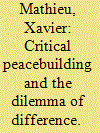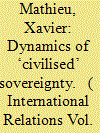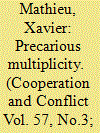| Srl | Item |
| 1 |
ID:
164029


|
|
|
|
|
| Summary/Abstract |
Recent research has revealed the need to include and understand local actors in order to improve the effectiveness of peacebuilding. According to these analyses, peacebuilding could become more respectful of cultural differences thanks to a genuine engagement with the specificities of the local. Empirical studies of the ‘different’ local have thus flourished in the field with the ambition of countering the universalist tendency of traditional peacebuilding. Through the use of the concept of ‘dilemma of difference’, this article challenges this intuitive argument and argues that these approaches risk reproducing a stigma attached to the ‘different’ local. Indeed, emphasising difference in order to ensure its respect means separating and reifying ‘it’ as a deviation from the norm(al). As such, this analytical strategy is likely to recreate the stigma that contributed to the exclusion of local actors in previous peacebuilding practice and research. In contrast, I outline three strategies for studying difference differently in peacebuilding: focusing on the institutional arrangements that enabled specific differences to emerge and become visible; recognising that these differences are internal to peacebuilding (and thus an unlikely source of alternative and emancipation); and revealing the unstated and implicit Self for/from whom local difference is relevant.
|
|
|
|
|
|
|
|
|
|
|
|
|
|
|
|
| 2 |
ID:
163101


|
|
|
|
|
| Summary/Abstract |
Critical and post-colonial scholars have argued that a more complete account of sovereignty necessitates an exploration of the colonial experiences through which Western civilised identity was forged. But the way these ‘distant’ encounters were used in (and interacted with) the process of claiming sovereignty domestically has received less attention. This is surprising as critical scholars have revealed the existence of strong similarities between the domestic and international constructions of sovereignty (and in particular the necessary performance of a savage Other) and have emphasised how sovereignty transcends the domestic/international frontier and provides a crucial link between the two. As a response, this article develops an analysis of the construction of sovereignty that combines both the domestic and international colonial frontiers on which ‘civilised’ sovereignty relies. I use a large set of primary archives about France in the sixteenth century in order to explore how sovereignty depends on unstable colonial frontiers, that is, differentiations between the civilised and the savage, that are constantly contested and re-established. Combining the domestic and international colonial frontiers reveals how they interact and are used in order to reinforce the civilised identity of the Western ruler.
|
|
|
|
|
|
|
|
|
|
|
|
|
|
|
|
| 3 |
ID:
188698


|
|
|
|
|
| Summary/Abstract |
This article investigates the portrayal by French policy-makers of the so-called Islamic State ‘foreign fighters’. I provide an in-depth analysis of the discursive construction of these ‘foreign fighters’ as different and detached from the (French) Self. I do so through a questioning of the notion of multiplicity, revealing how it exists precariously and the consequences this precariousness has on the notion itself. First, multiplicity emerges in ‘strange’ places as identities are being remodelled through new combinations. Second, the coexistence implied by multiplicity needs to be complexified to account for the way it helps preserve but also sometimes erase difference (and thus multiplicity itself). Finally, because of the precariousness of multiplicity, unexpected outcomes can be produced by the encounter with difference (such as the policy of non-repatriation of the ‘foreign fighters’). Overall, multiplicity can be usefully questioned by looking at these instances of instability and doubt. As such, this article shares the concerns expressed by critical scholars that multiplicity recreates problematic distinctions between inside and outside. As a response, my analysis contributes to an understanding of multiplicity as always in the making, revealing how various discursive strategies are used to temporarily and imperfectly stabilise boundaries.
|
|
|
|
|
|
|
|
|
|
|
|
|
|
|
|